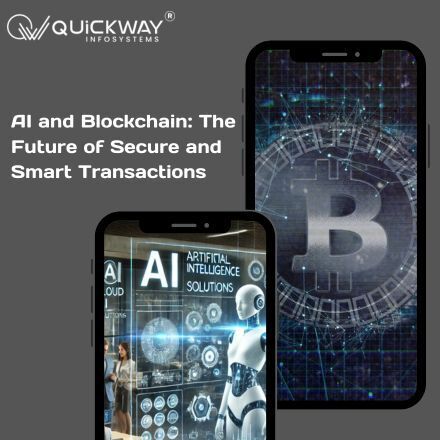
In today's digital landscape, the integration of AI and blockchain integration is revolutionizing the way transactions are processed, verified, and secured. Both technologies, while powerful on their own, create a synergy that enhances security, efficiency, and automation when combined. From finance to healthcare, supply chain to governance, the fusion of AI and blockchain is shaping the future of secure and smart transactions.
Understanding AI and Blockchain
Artificial Intelligence (AI) refers to intelligent systems that can analyze data, learn patterns, and make decisions without human intervention.
Blockchain is a decentralized, tamper-proof ledger technology that records transactions securely and transparently.
When these two technologies merge, they provide automated, trustworthy, and efficient transaction processes that reduce fraud, enhance decision-making, and streamline operations.
The Role of AI in Blockchain Transactions
AI enhances blockchain-based transactions by introducing intelligence and automation in key areas such as:
1. Fraud Detection and Prevention
AI can analyze transaction patterns to identify anomalies and potential fraudulent activities.
Machine learning algorithms continuously improve fraud detection capabilities, reducing financial risks for businesses and consumers.
2. Smart Contracts and DAOs
Smart contracts and DAOs (Decentralized Autonomous Organizations) operate through blockchain networks, executing transactions automatically based on predefined rules.
AI enhances smart contracts by optimizing their logic, ensuring efficiency, and reducing vulnerabilities in contract execution.
AI-powered DAOs enable automated decision-making, governance, and decentralized financial management.
3. Automated Risk Assessment
AI evaluates transaction risks in real-time, preventing financial fraud and unauthorized activities.
Predictive analytics help in assessing the reliability of users, reducing the chances of identity theft or cyberattacks.
The Role of Blockchain in AI-driven Transactions
Blockchain, on the other hand, addresses some of AI’s biggest challenges, such as data security, transparency, and trust.
1. Data Security and Privacy
Blockchain encrypts AI-generated data, ensuring its integrity and preventing unauthorized access.
Decentralized storage of AI training data reduces the risks of data breaches and cyberattacks.
2. Transparency and Trust
Blockchain creates an immutable audit trail for AI decisions, improving accountability and compliance.
AI models deployed on blockchain ensure that their decision-making process is traceable and cannot be manipulated.
3. Decentralized AI Networks
Instead of relying on centralized cloud servers, AI models can operate within decentralized blockchain networks, reducing single points of failure.
Blockchain-based AI marketplaces allow businesses and developers to securely share and monetize AI models.
Applications of AI and Blockchain Integration
The combination of AI and blockchain is transforming multiple industries, providing more secure and intelligent transaction mechanisms.
1. Finance and Banking
AI-driven blockchain solutions streamline payment processes, reduce fraud, and enhance identity verification.
Smart contracts facilitate instant and automated financial transactions with high security and minimal costs.
AI-powered credit scoring enables more accurate lending decisions based on blockchain-verified financial histories.
2. Healthcare
Blockchain in finance and healthcare ensures the integrity of medical records and protects sensitive patient data.
AI-powered diagnostics combined with blockchain-based patient records improve the accuracy of medical treatments.
AI-driven drug research and trials benefit from blockchain transparency, reducing manipulation of clinical data.
3. Supply Chain and Logistics
AI optimizes supply chain efficiency by predicting demand and tracking inventory.
Blockchain provides end-to-end transparency, ensuring product authenticity and reducing counterfeit goods.
AI-powered automation in logistics reduces delays, improves delivery timelines, and minimizes human errors.
4. Government and Identity Management
AI-enhanced identity verification systems use blockchain for secure and fraud-proof digital identities.
Governments leverage AI-blockchain solutions for transparent voting systems and streamlined public services.
AI-powered automation in governance reduces bureaucratic inefficiencies and enhances service delivery.
5. Retail and E-commerce
AI-driven personalized shopping experiences are secured by blockchain’s tamper-proof transaction records.
Smart contracts enable automatic refunds, dispute resolution, and seamless digital transactions.
AI-powered chatbots and blockchain-backed authentication systems enhance customer trust and engagement.
Challenges in AI and Blockchain Integration
Despite its potential, AI and blockchain integration face challenges such as:
Scalability Issues – Processing AI-powered blockchain transactions can be slow and expensive due to high computational requirements.
Energy Consumption – Both AI training models and blockchain mining consume significant energy, requiring sustainable solutions.
Regulatory Uncertainty – Governments are still developing policies to address legal and ethical concerns surrounding AI and blockchain applications.
Interoperability Challenges – Ensuring seamless communication between AI-driven platforms and blockchain networks remains a technical challenge.
The Future of AI and Blockchain Transactions
As AI and blockchain technologies evolve, their integration will become more widespread, leading to:
More Efficient Financial Transactions – AI-driven automation combined with blockchain security will eliminate delays and inefficiencies in digital payments.
Decentralized AI Economies – AI-based applications will operate on blockchain networks, creating trustless ecosystems for digital services.
Enhanced Cybersecurity – AI will detect and respond to security threats while blockchain ensures data integrity and privacy.
Smarter DAOs and Governance Models – AI-enhanced smart contracts and DAOs will lead to more autonomous and efficient decentralized organizations.
Conclusion
The convergence of AI and blockchain integration is paving the way for a new era of secure and smart transactions. With AI’s ability to analyze and automate complex processes and blockchain’s ability to ensure trust and security, industries worldwide are witnessing transformative changes. From smart contracts and DAOs to AI-driven fraud detection and blockchain-based data protection, this fusion is shaping the future of finance, healthcare, supply chains, and beyond. As adoption increases, AI and blockchain will drive unprecedented innovation, making transactions more efficient, transparent, and secure for businesses and consumers alike.


Top comments (0)